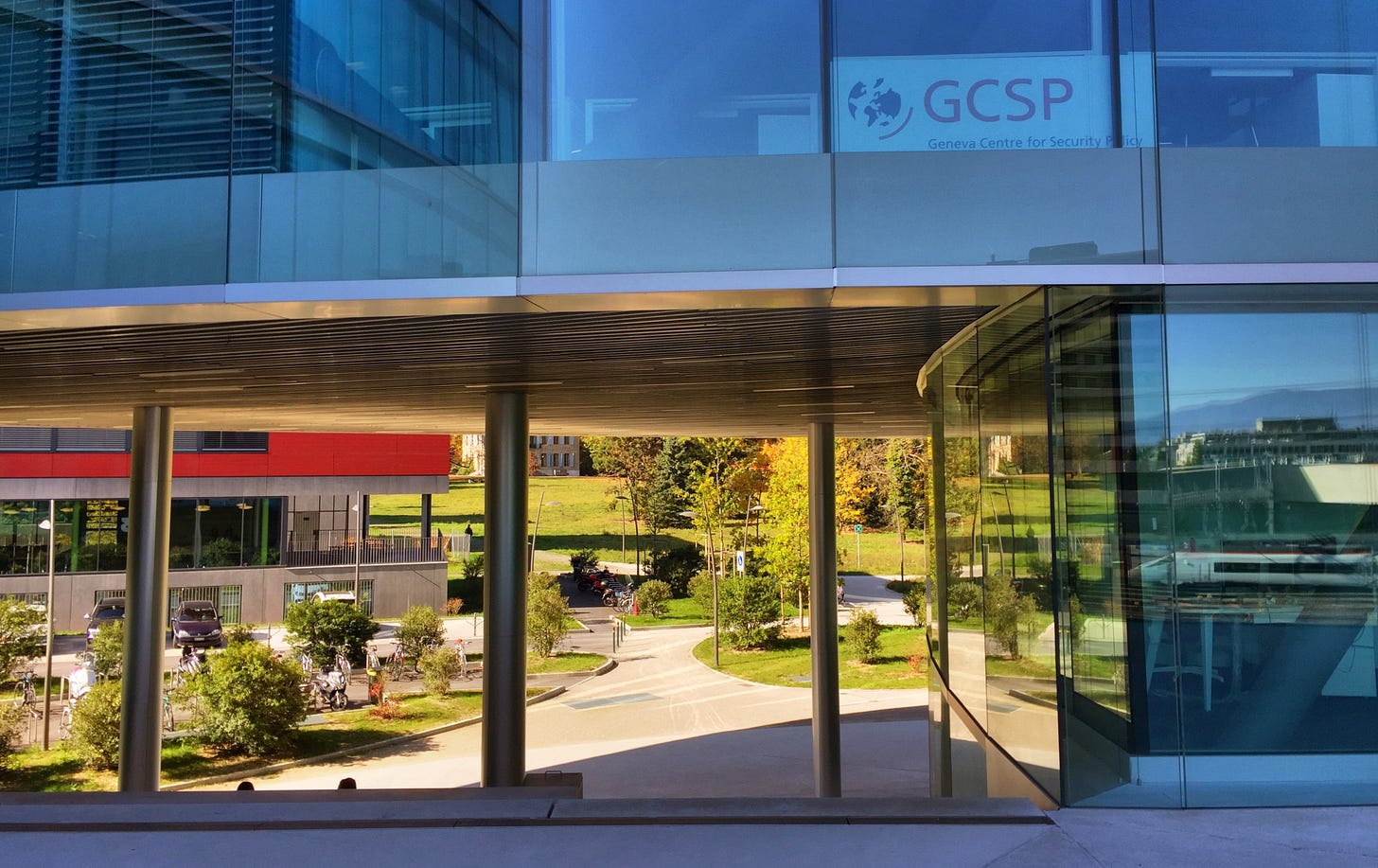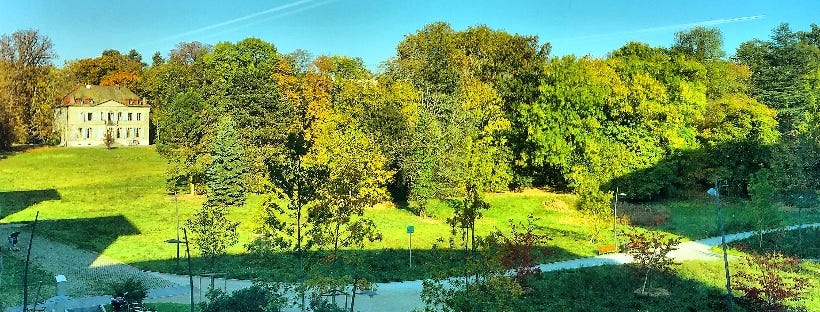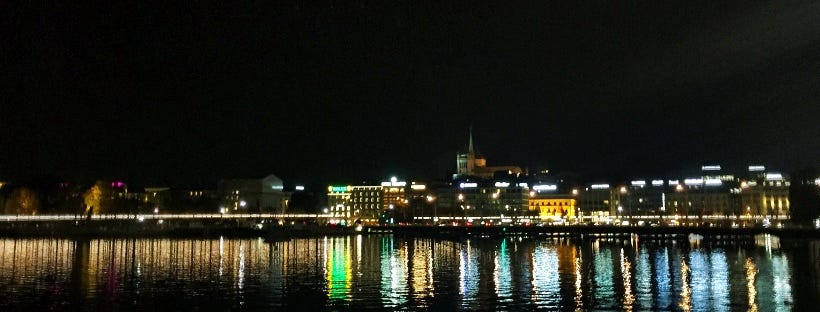You eat a credit card size amount of microplastics every week
A GCSP interview with Alexander Verbeek on climate change, environmental activism, the climate summit, the pandemic, pollution, biodiversity loss, and other global challenges.
If you want to skip my writing and want to listen to the interview, click here:
This short credit card statement in the half-hour GCSP interview became the headline posted on social media. We spoke about plastic pollution, but it was just one of the many issues we discussed, which characterizes the Geneva Centre for Security Policy. They always look for a broad perspective on peace, security, and international cooperation issues and connect the dots worldwide.
Those of you who have been following my speeches and writings will recognize my preference for combining a wide range of issues into one story. It makes a story more attractive, and it is also necessary because there often isn't just one story to tell. There are many ways of looking at a particular situation. And that brings me to another reason I like to work at the GCSP as an Associate Fellow; it is not that we only look at different angles at one issue; we actively look for a diverse mix of both speakers and participants.
In all the lectures I gave in the past decade, the GCSP is where I felt that I learned just as much from the insights of the creative, forward-looking participants as that I could ever teach them. I believe the counting of different nationalities that have participated in their meetings stands at 184. Any measurement for the diversity in the participants' backgrounds would also get a high score.
I also recognize that in Dr. Paul Vallet, the interviewer and also an Associate Fellow at GCSP. He easily swings from Biden's Leaders Summit on Climate to historical figures, activism, India, the Apollo 8 crew, the pandemic, and then makes the full circle back to environmental activism.
The GCSP courses are, as you would expect, still online because of the pandemic. That may have the apparent disadvantage of missing the informal networking during the breaks in the beautiful Maison de la Paix in Geneva, but I found some positive sides. Instead of being less connected without our international flights, you could just as well argue that our Generation Zoom connects easier, faster, environmentally friendlier, and over longer distances than we used to do. It also means for those of you reading this in a place far away from Geneva that your options to participate in any of the courses or activities are equal, whether you are in next door Lausanne or in a lockdown situation on another continent.
Perhaps it is something for you? If you are interested in advancing peace, security, and international cooperation, look at the Geneva Centre for Security Policy courses.
To follow the Geneva Centre for Security Policy on Twitter, click here:
I miss Geneva, where I negotiated so many days and weeks that I have lived about a year of my life in that UN city on the lake. To refresh my memory, I will dig up some photos and add them to this newsletter.
Before I leave you, back to that credit card: the University of Newcastle researched this two years ago for WWF. Does each of us eat a credit card every week? We eat different food and live in other places, and this is a global average. It is also a new field of research where further studies are needed. But the comprehensive review of existing studies to estimate plastic ingestion through inhalation, food, and beverages led to a consensus among specialists that these numbers are in a realistic range. Further studies will bring more detailed insights.
Bottled water and shellfish
The media loved the story, and your weekly credit card snack was briefly a hit on social media. As you would expect, we are talking about 'microplastics,' tiny pieces of plastic smaller than five millimeters. Around the world, people ingest an average of around 2,000 of these particles per week. Our plastic waste breaks down into ever smaller pieces. These find their way into our rivers and the oceans before they find their way back into our food chain, like water, beer, fish, or salt. Most of these particles get into your body via water. If you live in the US or India, you digest twice as many as in Europe. And if you need an extra reason not to buy bottled water: that is good for up to 90,000 excess particles per year. Sadly, those who throw away their plastic bottles contribute to even more microplastics in the next bottle.
Shellfish is the second most significant source of microplastics in our food. So if you don't like the weekly credit card snack, you can drink less bottled water and stop eating shellfish. And that may be a good starting point for eating less of all kinds of other animals. The animals thank you for that gesture, and so does the planet that is over its limits to provide animal-based food for all of us: less suffering, less environmental destruction, and better health.
I guess I made my point. I will end with my rather lengthy introduction to get you to listen to this podcast. As always, I am interested to hear what you think. I will first add this podcast again for those who started reading, and then I will add those photos to give an impression of Geneva.













My first thought was “ew!” And then I saw your comment about Geneva. I, too, miss Geneva. I remember what it brought me in my life, and I remember the clarity of thought that I had when I was there, on larger issues. I have a phrase I use with friends when I am faced with a very challenging yet potentially very creative day of solutions-finding: “Let’s have a Geneva coffee...” which for us means, let’s grab a Lavazza coffee from the United Nations vending machine in the lower level of Building E of the Palais des Nations, coffee that is strong and sweet, and let’s get to work. So, on the issue of plastics and micro beads, I say, “Let’s grab a Geneva coffee and get to work on this... what direction do we want to go? What do we want to write at the center of the conceptual mind map of these solutions?” I leave you with that thought as I jump into my day, and I contemplate fewer disposables, fewer coffee cups, fewer vending machines... and simultaneously, more good coffee.
Very interesting interview. So much to think about. Thank you for sharing this.
I like the GCSP, well worth a follow. Coincidentally, I was sitting on a train that would have continued on to Geneva when I listened to the podcast. I don't think I've ever given much thought to all the good things that have come out of Geneva.
Love your pictures as well.